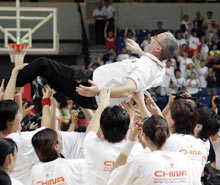| Tools: Save | Print | " target="_blank" class="style1">E-mail | Most Read |
| Maher Looks Ahead to Worlds |
| Adjust font size: |
But back in March when he arrived in China with his family and full of fresh ideas, he was widely doubted by fans and media and after a disappointing start to the championships, the voice of doubt grew louder. But only three months after taking the helm, Maher has changed the outlook of China's women's basketball team. "My target is to develop them into one of the world's top teams which is able to compete with hoop giants like Russia and the United States," he said. With his strong determination to make China an "elephants' team," Maher renounced traditional Chinese style - fast play and outside shots, which China's women had adopted over the past decade. Instead, he is trying to form a "bigger" team with taller line-up. And he introduced China to the prevailing western style with paint-attack and physical one-on-one defence. "There are distinct styles in the world and I just want to use the best of them," said Maher. "North America has the best defence in the world and that's how I want my players to play." Narrowly avoiding an upset in the opener against Chinese Taipei and after a 63-56 loss to South Korea, the 53-year-old coach was criticized for his style and the rotation of substitutions. Missing pivot guard Miao Lijie and top-scorer Sui Feifei, who is playing for the Sacramento Monarchs in the Women's National Basketball Association in America, China finished second in the preliminary round with three wins and one loss, which did not satisfy the local public. But Maher was patient, and said the team was still in a run-in period. "We're not a season team, not a veteran team. We're a young and talented team and we need practice," Maher explained. "My only goal is the 2008 Games." "I did not mind when we lost to the Koreans. What I care about is if we will be a better team, with this young team, three years from now." Maher also said the team had no certain "starting lineup" and he spread time on court between 11 of his 12-member squad at the championships. "I don't have a starting five for the squad. Everybody is in the first team because everybody needs time," he explained. It was his "elephant style" that effectively limited South Korea, which boasts a number of outside shooters, to only 6-for-14 from the three-point arc. China also dominated the paint with 38 rebounds while their opponents only grabbed 22. "I am happy with the Asian title but this is just the beginning for me and my players," said Maher. "I would give 90 points to the success at the Asian Championships but in terms of where the team want to be, our current performance scores 60 or 70." But the players are getting used to his style and supporting their new coach. "Chinese players are not used to playing at their best the moment the step onto the court," said Chen Nan, who sparkled with 25 points and eight rebounds in the final on Sunday. "But we are now confident and have a strong desire to play. For us, what we need to do is just get used to the style of the coach, and not let the coach get used to us." Her teammate Song Xiaoyun joined the praise for Maher, saying he was taking the team on the right path. "Maher is a world-famous coach. What he teaches us is good for the team, though it might not be easy to learn," point guard Song said. "He asked us to come out at the very beginning of the game. It helps us to concentrate, to do our best in the limited playing time. We believe he will make this team better," she added.
High target Despite winning the Asian title, Maher is not satisfied with this early success, saying he is targeting a medal at the World Championships next year. "My biggest hope is to win a medal in the World Championships," said Maher at a post-match news conference. After the team's humiliating ninth place at the Athens Olympics, the keenly-awaited victory on the Asian stage delighted everyone, but a medal is the one thing Chinese fans want most. "I don't want to get stuck on this victory," Maher said. "They proved they can be very competitive and that gave me a lot of confidence to develop the team my way in the future." China last won a medal at the World Championships in 1994, when the team took the silver with the help of star centre Zheng Haixia. (China Daily June 30, 2005)
|
| Tools: Save | Print | " target="_blank" class="style1">E-mail | Most Read |
 |
| Related Stories |


